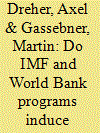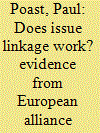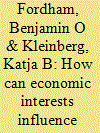|
|
|
Sort Order |
|
|
|
Items / Page
|
|
|
|
|
|
|
| Srl | Item |
| 1 |
ID:
112458


|
|
|
|
|
| Publication |
2012.
|
| Summary/Abstract |
Governments have joined the World Trade Organization (WTO) in vastly different ways: some have taken mere days to join without undertaking any trade liberalization, while others have taken more than a decade and been forced to undergo significant liberalization. We argue that the more rigorous a state's accession to an international organization (IO), and thus the greater policy change required to join, the greater the benefits it will receive from membership in the organization. In the trade context, states facing greater scrutiny from the WTO and thus engaging in greater trade liberalization as part of the WTO accession process should experience greater trade on joining compared to those who face little scrutiny and engage in little if any liberalization. We develop a three-part classification of WTO members based on type of accession-early, automatic, and rigorous-and then compile detailed original data on the accession experiences of each relevant state, including length of time, number of veto players, rounds of questions, and tariff and nontariff commitments. Results of exhaustive quantitative tests on all countries from 1950 to 2006, which are robust to estimator, sample period, and model specification choices, consistently demonstrate that those who engage in the greatest amount of accession-driven liberalization experience the greatest trade increases from WTO membership, particularly in the years right after joining. In contrast, those who do little or nothing to join do not see any trade gains from being a WTO member. These findings reconcile previous findings on the effects of WTO membership on trade, highlight the causal importance of IO accession, and illuminate the conditions under which IOs will have beneficial effects for member states.
|
|
|
|
|
|
|
|
|
|
|
|
|
|
|
|
| 2 |
ID:
112461


|
|
|
|
|
| Publication |
2012.
|
| Summary/Abstract |
We examine whether and under what circumstances World Bank and International Monetary Fund (IMF) programs affect the likelihood of major government crises. We find that crises are, on average, more likely as a consequence of World Bank programs. We also find that governments face an increasing risk of entering a crisis when they remain under an IMF or World Bank arrangement once the economy's performance improves. The international financial institution's (IFI) scapegoat function thus seems to lose its value when the need for financial support is less urgent. While the probability of a crisis increases when a government turns to the IFIs, programs inherited by preceding governments do not affect the probability of a crisis. This is in line with two interpretations. First, the conclusion of IFI programs can signal the government's incompetence, and second, governments that inherit programs might be less likely to implement program conditions agreed to by their predecessors.
|
|
|
|
|
|
|
|
|
|
|
|
|
|
|
|
| 3 |
ID:
112459


|
|
|
|
|
| Publication |
2012.
|
| Summary/Abstract |
Though scholars widely claim that issue linkage-the simultaneous negotiation of multiple issues for joint settlement-can help states conclude international agreements, there exist some notable skeptics. Resolving this debate requires empirical evidence. However, beyond a few case studies, there exists no direct and systematic evidence that issue linkages actually increase the probability of agreement. I address this lack of direct and systematic evidence by combing original data on failed alliance negotiations with data from the Alliance Treaty Obligations and Provisions (ATOP) database. Using matching techniques, I find that, for alliance negotiations between 1860 to 1945, offers of trade linkage did substantially increase the probability of agreement. Besides confirming issue linkage's ability to help clinch an agreement, this article's research design and evidence have far-reaching implications for the study of negotiations and alliances. The research design illustrates the value of considering the "dogs that didn't bark" as it identifies both successful and failed negotiations. The article's evidence explains the high rate of alliance compliance identified by previous scholars and highlights a need to rethink the alliance formation process.
|
|
|
|
|
|
|
|
|
|
|
|
|
|
|
|
| 4 |
ID:
112460


|
|
|
|
|
| Publication |
2012.
|
| Summary/Abstract |
Recent research on the sources of individual attitudes toward trade policy comes to very different conclusions about the role of economic self-interest. The skeptical view suggests that long-standing symbolic predispositions and sociotropic perceptions shape trade policy opinions more than one's own material well-being. We believe this conclusion is premature for two reasons. First, the practice of using one attitude to predict another raises questions about direction of causation that cannot be answered with the data at hand. This problem is most obvious when questions about the expected impact of trade are used to predict opinions about trade policy. Second, the understanding of self-interest employed in most studies of trade policy attitudes is unrealistically narrow. In reality, the close relationship between individual economic interests and the interests of the groups in which individuals are embedded creates indirect pathways through which one's position in the economy can shape individual trade policy preferences. We use the data employed by Mansfield and Mutz to support our argument that a more complete account of trade attitude formation is needed and that in such an account economic interests may yet play an important role.
|
|
|
|
|
|
|
|
|
|
|
|
|
|
|
|
| 5 |
ID:
112456


|
|
|
|
|
| Publication |
2012.
|
| Summary/Abstract |
This article aims to rethink the operation of norms in international policy diffusion. Norms do not simply standardize state behaviors, as is conventionally argued; norms also draw on and set up hierarchical social orders among states. Through a conceptual rethinking we gain a better understanding of where-among which states-new policies may first emerge: social hierarchies create incentives for new policies to develop at the margins of international society so that policies may diffuse "from below." We also get a better grasp of how policy advocates frame the appropriateness or benefits of a new state practice: they must frame policy demands in terms of the international standing and rank of the targeted state. This article's empirical aspiration is to use these insights to help account for the international policy diffusion of legal sex quotas, a policy to increase the level of female legislators that developed first among "developing" states rather than among the so-called core of international society. By pointing to the link between norms and social hierarchy, the article helps account for policy diffusion "from below."
|
|
|
|
|
|
|
|
|
|
|
|
|
|
|
|
| 6 |
ID:
112457


|
|
|
|
|
| Publication |
2012.
|
| Summary/Abstract |
This article provides foundations to Polanyi's famed argument that monopoly power in the global capital market served as an instrument of peace during the Pax Britannica (1815-1914). Our perspective is novel-we focus on the role of intermediaries and certification. We show that when information and enforcement are imperfect, there is scope for the endogenous emergence of "prestigious" intermediaries who enjoy a monopoly position and as a result, control government actions. They can implement conditional lending: they subject the distribution of credit to the adoption of peaceful policies. Prestigious intermediaries act that way because of their concern with maintaining an unblemished track record when wars increased risks of default. Our analysis, which brings together insights from different disciplines, provides a significant extension to, and departure from, recent research on how countries accumulate reputational capital.
|
|
|
|
|
|
|
|
|
|
|
|
|
|
|
|
|
|
|
|
|